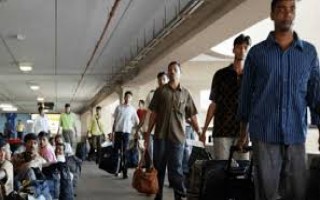2,700 jobless Bangladeshi migrants returning a day

Around 2,700 Bangladeshi migrant workers on average returned home jobless every day from different countries in November as the COVID-19 pandemic continues to weaken the global economy.
Migration experts said that the inflow of jobless migrants would continue as the air travel started to become normal and a large a number of stranded workers would return soon.
Economists said that migrant workers’ job losses and their return to the country would affect the country’s remittance earning, one of the main pillars of the economy.
According to Bureau of Manpower, Employment and Training data, 80,968 migrants returned home in November, raising the total number of returnees to 3,26,785 since the workers had started returning in April after losing their jobs due to the coronavirus pandemic.
BMET director general Shamsul Alam told New Age that the large number of Bangladeshi migrant workers lost jobs as the destination countries were facing new challenges due to the pandemic.
‘We are searching for new markets and raising skills of the returnees so that they could get new jobs either in the country or abroad,’ he said.
In the pre-pandemic period, around 55,000 people on average used to leave Bangladesh every month for livelihoods for 173 destination countries, mainly in Middle East. But the migration has now almost come to a halt.
Around one lakh people who had completed all procedures could not fly at the eleventh hours in March, April and May due to the coronavirus outbreak across the globe, according to official data.
The BMET data showed that nearly 20,000 people went abroad in the last eight months whereas 1,40,525 people went abroad in October- November in 2019 with over seven lakh people migrating to various countries in the year.
Dhaka University professor and founding chairman of Refugee and Migratory Movements Research Unit Tasneem Siddiqui said that the government in cooperation with non-government organisations and donors should take moves to ensure livelihoods of the large number of returnee migrants.
She said that incentives should be distributed fairly among the migrants and they should be re-skilled according to market demands and reintegrated according to their needs.
Shariful Hasan, migration programme head of non-government organisation BRAC, suggested that the government should go for proper diplomatic activities so that the host countries do not send back any more workers.
He also urged the government to search for new markets and take a pragmatic reintegration plan.
Moslem Miah who returned from Kingdom of Saudi Arabia in November after losing his job two months ago due to COVID-19 said that he had tried his best to get another job but failed.
‘There is a large number of people who are still trying to manage alternative jobs but there is a scarcity of jobs,’ said Moslem, now living in Ashulia unemployed.
Amid the pandemic, Bangladesh in November received $2.09 billion in remittance, up by 34.23 per cent, or $532.51 million than that in the same month of the previous year, according to Bangladesh Bank data.
Ahsan H Mansur, executive director of the Policy Research Institute of Bangladesh, said that it was not a sustainable growth of remittance when a large number of migrants returned and many more lost their income.
He said that the remittance might have increased due to people to sending money through the banking channel instead of hundi as the government was giving two per cent incentives against the remittance.
Expatriates’ Welfare and Overseas Employment ministry officials said that a large number of Bangladeshi migrants became jobless in Saudi Arabia, UAE, Kuwait, Oman, Bahrain and Maldives due to the economic rescission.
Besides, many Bangladeshi migrants in European countries have become jobless due to the coronavirus outbreak, they said.
According to an International Labour Organisation study, conducted by non-government research organisation iSocial, five million Bangladeshi migrant workers might return from different countries due to coronavirus pandemic.
The study is yet to be published.
Over 10 million Bangladeshi migrant workers in 173 countries across the world in 2019 sent home approximately $18.35 billion , which was 40 per cent of the total foreign exchange reserve of the country, according to the BMET data.
Of the migrants, about 80 per cent are employed in the gulf and East Asian countries, said BMET officials.
New Age











